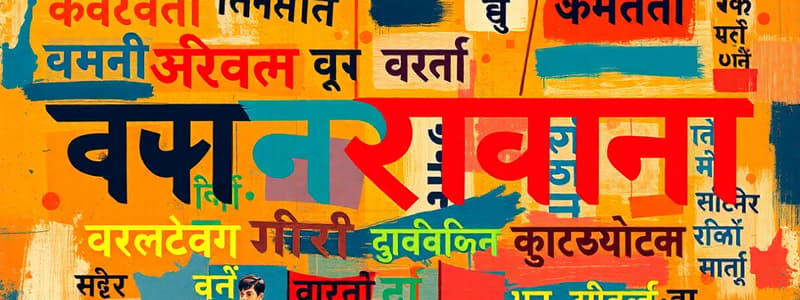Podcast
Questions and Answers
What is the official language of Maharashtra?
What is the official language of Maharashtra?
- Bengali
- Marathi (correct)
- Hindi
- Gujarati
Which script is used for writing the Marathi language?
Which script is used for writing the Marathi language?
- Cyrillic script
- Latin script
- Arabic script
- Devanagari script (correct)
Which of the following is a characteristic of Marathi grammar?
Which of the following is a characteristic of Marathi grammar?
- No tense conjugation
- Gendered nouns (correct)
- Nouns categorized by color
- Subject-Verb-Object (SVO) structure
Which of these is a notable genre in Marathi literature?
Which of these is a notable genre in Marathi literature?
Which of the following contributes to the vocabulary of Marathi?
Which of the following contributes to the vocabulary of Marathi?
Which dialect is considered the formal and literary version of Marathi?
Which dialect is considered the formal and literary version of Marathi?
What are common influences on Marathi vocabulary?
What are common influences on Marathi vocabulary?
Which festival prominently features the Marathi language?
Which festival prominently features the Marathi language?
Flashcards are hidden until you start studying
Study Notes
Overview of Marathi
- Language Family: Indo-Aryan, a branch of the Indo-European language family.
- Region: Primarily spoken in the Indian state of Maharashtra.
- Speakers: Approximately 83 million speakers (as of 2011 census).
- Official Status: One of the 22 scheduled languages of India and the official language of Maharashtra.
Script
- Writing System: Devanagari script, also used for Hindi, Sanskrit, and several other languages.
- Characteristics: The script consists of vowels, consonants, and diacritics.
Dialects
- Standard Marathi: The formal and literary version of the language.
- Regional Variants: Includes Varhadi, Malvani, and Nagpuri, among others.
- Influence of Other Languages: Incorporates words from Urdu, Gujarati, and Hindi, reflecting cultural interactions.
Grammar
- Sentence Structure: Subject-Object-Verb (SOV) order.
- Gender: Nouns are categorized into masculine, feminine, and neuter.
- Tenses: Three main tenses - past, present, and future.
- Conjugation: Verbs are conjugated based on gender, number, and tense.
Vocabulary
- Rich Lexicon: Influenced by Sanskrit, Prakrit, and regional languages.
- Loanwords: Includes terms from Portuguese, Arabic, and English due to historical trade and colonial influences.
Literature
- Historical Roots: One of the oldest languages in India with a rich literary tradition.
- Notable Writers: Includes Sant Tukaram, P. L. Deshpande, and Vijay Tendulkar.
- Genres: Poetry, drama, novels, and essays.
Cultural Significance
- Folk Traditions: Includes Lavani and Tamasha, reflecting the state’s heritage.
- Festivals: Language plays a key role in celebrations like Ganesh Chaturthi and Gudi Padwa.
- Media: Marathi cinema (Marathi Chitrapat) and literature have a significant cultural impact.
Learning Resources
- Educational Institutions: Numerous universities and colleges offer Marathi language courses.
- Online Platforms: Websites and apps providing language learning tools and resources.
- Cultural Programs: Workshops, theater, and literature festivals to promote language and literature.
Overview of Marathi
- Language belongs to the Indo-Aryan branch of the Indo-European family.
- Primarily spoken in Maharashtra, a state in western India.
- Approximately 83 million speakers based on the 2011 census.
- Official language of Maharashtra and one of India's 22 scheduled languages.
Script
- Written in Devanagari script, which is also used for Hindi and Sanskrit.
- The script features a combination of vowels, consonants, and diacritics, enhancing phonetic representation.
Dialects
- Standard Marathi serves as the formal and literary variant of the language.
- Regional dialects include Varhadi, Malvani, and Nagpuri, each with unique characteristics.
- Vocabulary reflects cultural interactions by incorporating elements from Urdu, Gujarati, and Hindi.
Grammar
- Utilizes Subject-Object-Verb (SOV) sentence structure, common in many Indian languages.
- Nouns are classified into three genders: masculine, feminine, and neuter.
- Contains three primary tenses: past, present, and future.
- Verbs are conjugated according to gender, number, and tense, contributing to grammatical complexity.
Vocabulary
- Rich vocabulary influenced by classical languages such as Sanskrit and Prakrit, as well as regional languages.
- Includes loanwords from Portuguese, Arabic, and English, stemming from historical trade and colonial interactions.
Literature
- One of India's oldest languages, with a profound literary tradition dating back centuries.
- Celebrated writers include Sant Tukaram (poet), P.L. Deshpande (novelist), and Vijay Tendulkar (playwright).
- Encompasses diverse genres, including poetry, drama, novels, and essays, highlighting its literary breadth.
Cultural Significance
- Folk traditions like Lavani and Tamasha showcase Maharashtra's cultural heritage through music and dance.
- Language contributes significantly to festivals like Ganesh Chaturthi and Gudi Padwa, enhancing communal celebrations.
- Marathi cinema, known as Marathi Chitrapat, plays a crucial role in reflecting and shaping cultural narratives.
Learning Resources
- Many universities and colleges provide formal courses in the Marathi language.
- Numerous online platforms offer tools and resources for learning Marathi, including interactive apps.
- Cultural programs such as workshops and literature festivals promote engagement with the language and its literary heritage.
Studying That Suits You
Use AI to generate personalized quizzes and flashcards to suit your learning preferences.



